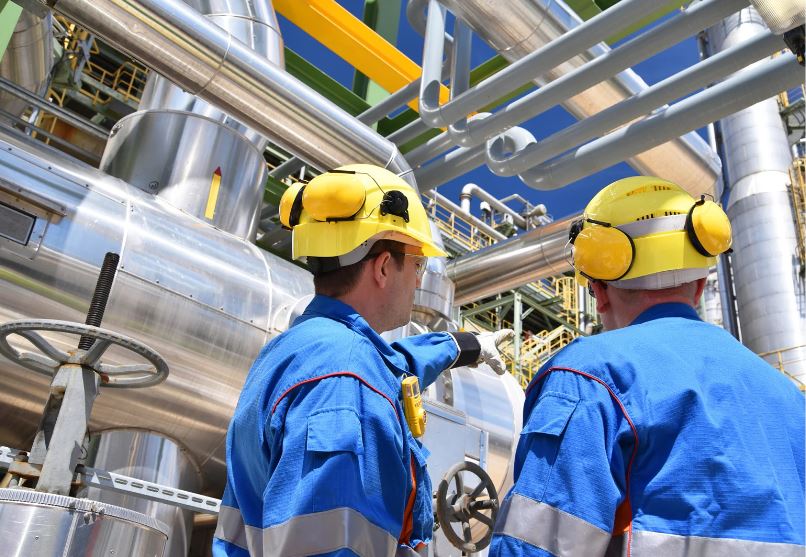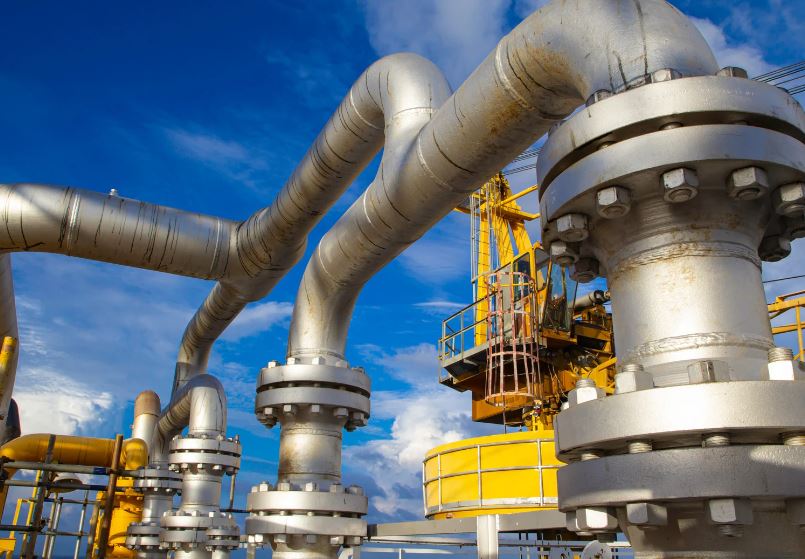In recent years, the oil and gas industry has witnessed a significant transformation with the integration of Artificial Intelligence (AI) technologies. AI has revolutionized various sectors, and the oil and gas industry is no exception. This article provides an introduction to AI in the oil and gas industry, highlighting the intersection of AI and the industry, as well as the benefits of utilizing AI.

The Intersection of AI and Oil and Gas
AI has found a natural fit within the oil and gas industry due to its complex and data-driven nature. The industry generates vast amounts of data from various sources such as seismic surveys, production logs, and drilling reports. AI technologies, including machine learning and deep learning algorithms, can efficiently process and analyze this data to extract valuable insights and drive informed decision-making.
The intersection of AI and the oil and gas industry opens doors to a wide range of applications. From optimizing exploration and production processes to enhancing safety measures and improving supply chain management, AI has the potential to revolutionize various aspects of the industry.
Benefits of Utilizing AI in the Oil and Gas Industry
The utilization of AI in the oil and gas industry brings forth numerous benefits. Here are some key advantages:
- Improved operational efficiency: AI-powered algorithms can analyze large volumes of data, enabling companies to identify trends, patterns, and anomalies that may go unnoticed by human analysis. This helps streamline operations, optimize production processes, and improve overall efficiency.
- Enhanced safety: AI plays a crucial role in improving safety standards in the industry. By analyzing real-time data from sensors and monitoring systems, AI algorithms can detect potential safety hazards and provide early warnings, helping to prevent accidents and ensure compliance with safety regulations.
- Cost savings: Through predictive maintenance and equipment monitoring, AI can help identify potential equipment failures before they occur, minimizing downtime and reducing maintenance costs. Additionally, AI-powered supply chain analytics can optimize inventory management and logistics, leading to cost savings.
- Environmental impact and sustainability: AI can aid in environmental monitoring and compliance, allowing companies to track and mitigate their environmental impact. Furthermore, AI can optimize resource management and enable the implementation of sustainable practices, contributing to the industry's sustainability goals.
Harnessing the power of AI enables the oil and gas industry to unlock new opportunities for efficiency, safety, cost savings, and sustainability. In the following sections, we'll explore specific use cases where AI is making a significant impact in the industry, covering exploration and production, operations and safety, supply chain and logistics, as well as environmental impact and sustainability.

AI Use Cases in Exploration and Production
Artificial Intelligence (AI) has proven to be a valuable tool in the oil and gas industry, revolutionizing various aspects of exploration and production. In this section, we will explore two key use cases where AI is making a significant impact: predictive maintenance and reservoir modeling and simulation.
Predictive Maintenance
Predictive maintenance is a crucial application of AI in the oil and gas industry. By leveraging AI algorithms and machine learning models, companies can analyze real-time data from sensors and equipment to predict and prevent potential failures before they occur.
Through continuous monitoring and analysis, AI algorithms can identify patterns and anomalies in the data, providing early warnings of impending equipment malfunctions or breakdowns. This enables proactive maintenance planning, reducing downtime and optimizing operational efficiency.
To better understand the benefits of predictive maintenance, let's take a look at some key statistics:
- Up to 30% reduction in maintenance costs
- Up to 50% reduction in equipment downtime
- Up to 20% increase in equipment lifespan
Implementing AI-powered predictive maintenance systems can lead to significant cost savings, improved asset utilization, and enhanced safety in the oil and gas industry.
Reservoir Modeling and Simulation
Reservoir modeling and simulation play a vital role in optimizing oil and gas exploration and production processes. AI techniques, such as machine learning and data analytics, are used to analyze vast amounts of geological and production data, enabling accurate reservoir modeling and simulation.
AI algorithms can analyze seismic data, well logs, and production history to create detailed reservoir models. These models provide valuable insights into the behavior and characteristics of reservoirs, helping engineers and geoscientists make informed decisions about drilling strategies, well placement, and production optimization.
AI-powered reservoir modeling and simulation tools simulate different scenarios and predict reservoir behavior, enabling companies to optimize production rates, minimize risks, and maximize recovery. This approach enhances operational efficiency and increases profitability.
The integration of AI in exploration and production processes is transforming the oil and gas industry, providing companies with valuable insights and enabling data-driven decision-making. As technology continues to advance, AI is expected to play an even more significant role in enhancing efficiency and productivity in this sector.
AI Use Cases in Operations and Safety
As the oil and gas industry strives for operational excellence and safety, the integration of artificial intelligence (AI) has become increasingly prevalent. AI has proven to be a valuable tool in enhancing operations and ensuring safety compliance in this industry. Let's explore two key use cases where AI is making a significant impact: safety monitoring and compliance, and equipment monitoring and optimization.
Safety Monitoring and Compliance
The oil and gas industry places a strong emphasis on safety, and AI technologies are playing a vital role in this area. AI can analyze vast amounts of data from various sources, such as sensors, cameras, and historical records, to detect potential safety hazards and monitor compliance with safety protocols.
AI-powered image recognition and video analytics enable companies to identify safety risks in real-time. For instance, AI algorithms can detect safety gear violations, unauthorized personnel in restricted areas, or potential equipment malfunctions. This capability facilitates proactive intervention and prompt corrective actions, reducing the risk of accidents and ensuring compliance with safety regulations.
Furthermore, AI can help streamline safety inspections and audits by automating the analysis of safety data, ensuring compliance with industry standards and governmental regulations. By implementing AI-driven safety monitoring and compliance systems, companies can create a safer work environment and minimize the chances of incidents occurring.
Equipment Monitoring and Optimization
Efficient management of equipment is crucial for the oil and gas industry to maximize productivity and minimize downtime. AI-powered equipment monitoring and optimization systems enable companies to monitor the health and performance of their assets in real-time.
Combining IoT sensors with AI algorithms enables companies to continuously monitor equipment parameters such as temperature, pressure, vibration, and energy consumption. This integration allows AI to analyze data for anomalies and patterns, providing early warnings of potential failures or malfunctions. As a result, businesses can proactively manage maintenance, minimizing unplanned downtime and reducing maintenance costs.
Additionally, AI can optimize equipment performance by analyzing data collected from sensors and historical records. By understanding usage patterns and performance trends, AI algorithms can recommend adjustments to operating parameters, optimizing equipment efficiency and extending its lifespan. This not only improves productivity but also contributes to cost savings and sustainability efforts.
Through AI-driven safety monitoring and compliance systems, companies can identify and address potential hazards in real-time, promoting a safer work environment. AI-powered equipment monitoring and optimization systems enable proactive maintenance and improve equipment performance, leading to increased productivity and cost savings. By harnessing the potential of AI, the oil and gas industry is driving success while prioritizing safety and operational excellence.

AI Use Cases in Supply Chain and Logistics
The application of artificial intelligence (AI) in the oil and gas industry extends beyond exploration and production. Supply chain and logistics are critical areas where AI technologies can bring significant advantages. In this section, we will explore two key AI use cases in supply chain and logistics: predictive analytics for supply chain management and route optimization and fleet management.
Predictive Analytics for Supply Chain Management
AI-powered predictive analytics plays a vital role in enhancing supply chain management in the oil and gas industry. By analyzing vast amounts of historical and real-time data, AI algorithms can generate valuable insights and predict future demand patterns, inventory levels, and potential supply chain disruptions. These insights enable companies to optimize their operations and make proactive decisions to meet customer demands efficiently.
One of the primary benefits of predictive analytics in supply chain management is the ability to optimize inventory levels. By accurately forecasting demand and considering various factors such as historical data, market trends, and external factors like weather conditions, AI algorithms can help companies maintain optimal inventory levels. This, in turn, minimizes excess stock and reduces the risk of stockouts, leading to cost savings and improved customer satisfaction.
Route Optimization and Fleet Management
In the oil and gas industry, efficient transportation and fleet management are crucial for timely and cost-effective operations. AI-based route optimization and fleet management solutions leverage advanced algorithms to optimize routes, minimize fuel consumption, and improve overall fleet efficiency.
AI algorithms consider various factors such as traffic conditions, road networks, delivery schedules, and vehicle capabilities to determine the most efficient routes for transporting goods and equipment. By optimizing routes, companies can reduce fuel consumption, lower transportation costs, and enhance delivery timeframes.
Furthermore, AI-powered fleet management systems enable companies to monitor and manage their vehicles in real-time. Through the integration of telematics devices and sensors, fleet managers can track vehicle locations, monitor fuel consumption, and gather data on driver behavior. This data can be analyzed to identify opportunities for improving driver performance, implementing preventive maintenance measures, and optimizing vehicle utilization.
AI-driven route optimization and fleet management enhance operational efficiency, reduce costs, and elevate overall supply chain performance for companies in the oil and gas industry.

AI Use Cases in Environmental Impact and Sustainability
As the oil and gas industry continues to prioritize environmental impact and sustainability, artificial intelligence (AI) has emerged as a powerful tool to drive positive change. In this section, we will explore two key use cases of AI in the industry: environmental monitoring and compliance, and sustainable practices and resource management.
Environmental Monitoring and Compliance
AI technologies play a crucial role in monitoring and ensuring compliance with environmental regulations in the oil and gas industry. By leveraging advanced sensors, data analytics, and machine learning algorithms, companies can gather real-time data on various environmental parameters, such as air and water quality, noise levels, and emissions.
These AI-powered systems continuously monitor environmental conditions, detect anomalies, and issue alerts in case of non-compliance. By identifying potential issues early on, companies can take proactive measures to address them and minimize the environmental impact of their operations. Such monitoring systems also help in meeting regulatory requirements and maintaining transparency with stakeholders.
Sustainable Practices and Resource Management
AI is also instrumental in promoting sustainable practices and efficient resource management within the oil and gas industry. By analyzing vast amounts of data, AI algorithms can optimize energy consumption, reduce waste, and improve overall operational efficiency.
For example, AI can be used to optimize drilling operations by analyzing geological data and real-time measurements. It enables companies to make data-driven decisions, leading to more accurate well placement and reduced environmental impact. Additionally, AI-based predictive analytics can help identify potential equipment failures and optimize maintenance schedules, minimizing downtime and waste.
Furthermore, AI can assist in optimizing resource allocation, such as water usage and chemical treatments, by analyzing historical data and environmental factors. This ensures that resources are used efficiently and responsibly, reducing both costs and environmental impact. AI plays a crucial role in environmental monitoring and sustainability practices within the oil and gas industry, enabling proactive management of environmental challenges, regulatory compliance, and sustainable operations.
As the industry continues to evolve, it is important for companies to embrace AI technologies and integrate them into their environmental management strategies. By doing so, they can drive positive change, minimize their ecological footprint, and contribute to a more sustainable future.

Harness IT Innovation in the Oil and Gas Industry with LK Tech!
Enhance efficiency and reliability across industries with LK Tech's customized IT solutions. As a trusted IT company in Cincinnati, we specialize in optimizing operations, enhancing security, and driving growth through innovative IT strategies. Whether you're in manufacturing, logistics, oil & gas, or beyond, our expertise ensures tailored solutions that meet your unique business needs.
Contact us today to discover how our comprehensive IT services can empower your organization to thrive in the digital age.


